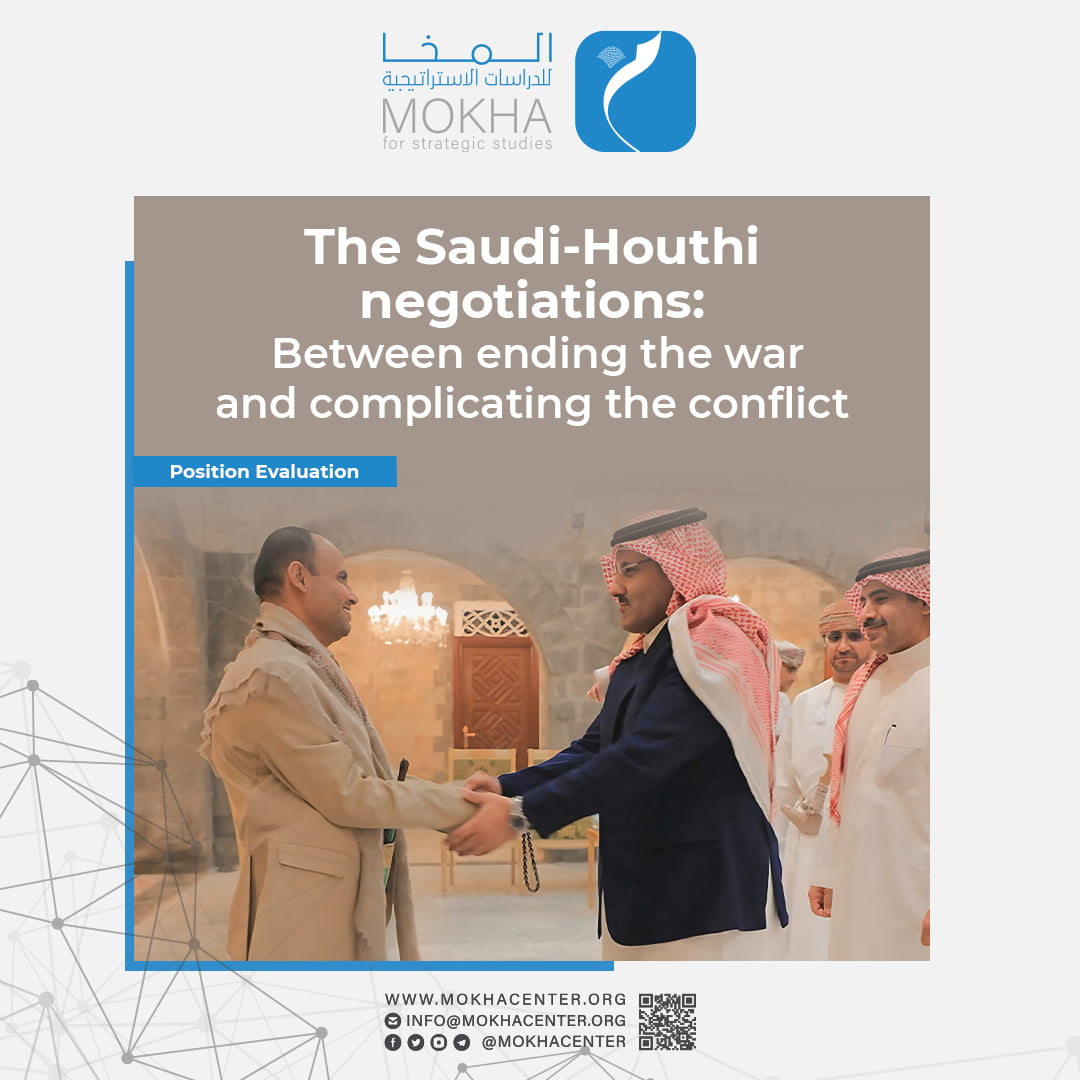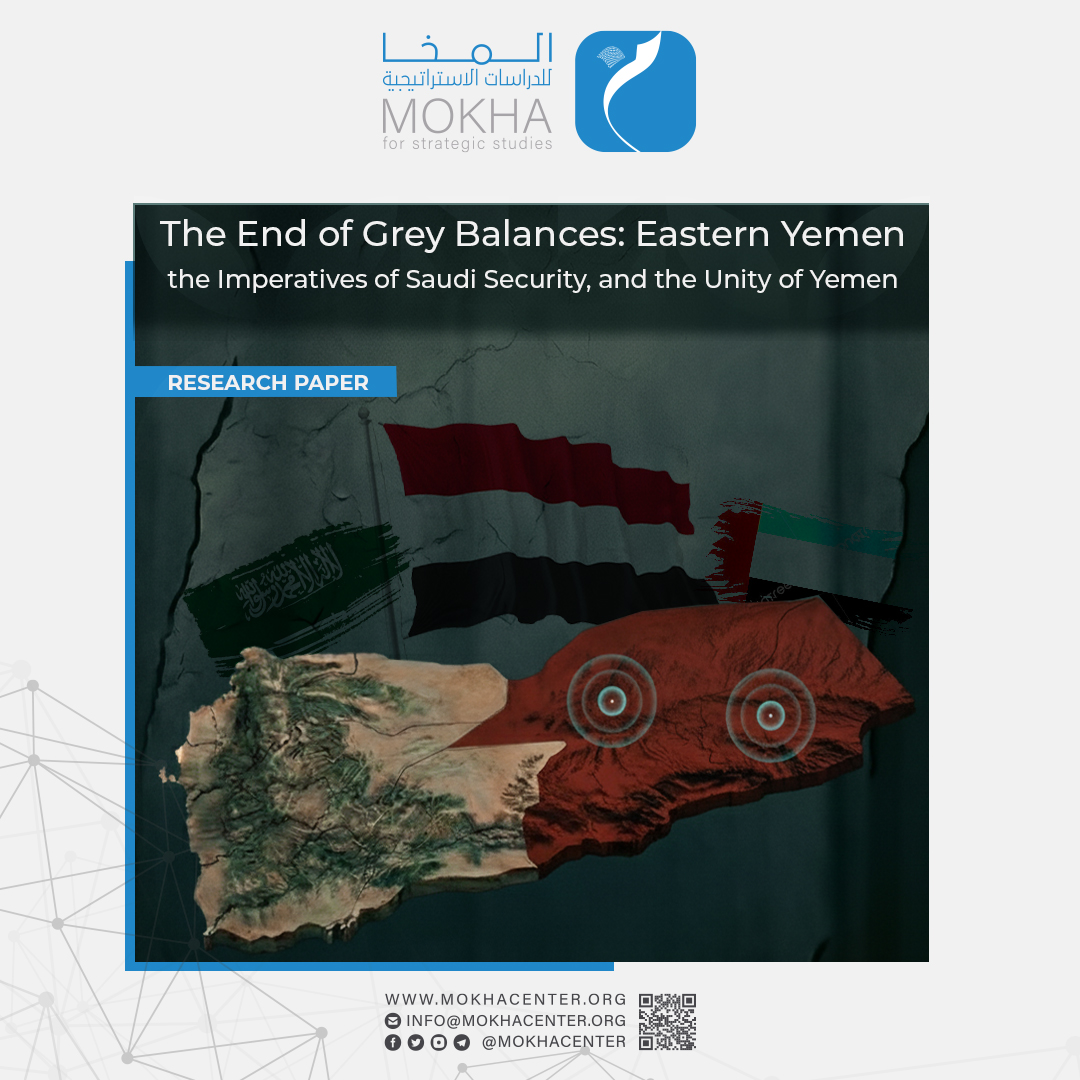The Saudi-Houthi negotiations: Between ending the war and complicating the conflict

April 2023 witnessed a dramatic development in the course of the conflict in Yemen since 2015. A Saudi delegation, led by Riyadh’s ambassador to the Yemeni government, Muhammad Al Jaber, visited Sana’a, accompanied by an Omani delegation. During the visit, they held talks with the Houthi group, which continued for six days (from April 8 to 13).
Most likely, the visit was aimed at putting the final touches on a vision for a comprehensive settlement of the war in Yemen, which had been negotiated between the two parties, in the Omani capital of Muscat. There was a plan that a delegation from the Houthi group leaders would be invited to visit the Kingdom of Saudi Arabia and sign the settlement project in the last days of Ramadan. However, events occurred that complicated the plan and necessitated holding a round — and perhaps new rounds — of negotiations, after Eid al-Fitr.
While many observers pinned their hopes on these negotiations to chart a course for a political settlement that would end the war in Yemen, an examination of the nature of the negotiations, the participating parties and the repercussions that can be based on them shows the limited positive returns expected from them.
Otherwise, if it reaches its limit, it may contribute to adding more complexity to the conflict in Yemen and may even cause — in addition to other factors, of course — the war to freeze, and prolong it, as well.
This paper deals with the course of the negotiations between Saudi Arabia and the Houthi group, its motives, especially from the Saudi side, and its repercussions on the course of war and peace in Yemen.
Early planning:
A closer reading indicates that the Saudi delegation’s visit to Sana’a was the result of early planning and that Saudi Arabia — which is the main controller of the conflict in Yemen — orchestrated the events that led to this defining moment at a time when its vital facilities were targeted by the Houthi group. Saudi Arabia had presented — in March 2022 — a political initiative, which included a ceasefire under the supervision of the United Nations, but the Houthis did not respond, and despite that, it continued to move toward this goal.
The biggest shift toward this path was the change supervised by Riyadh in the structure of the legitimate authority, through the removal of the two most solid men in the face of the Houthi group — the president of the Republic, Abd Rabbo Mansour Hadi, and his deputy, Lieutenant General Ali Mohsen Al-Ahmar — as they were replaced, on April 7, 2022, with an eight-person Presidential Leadership Council, led by Dr. Rashad Al-Alimi.
The presidential declaration for the transfer of power and the formation of the Presidential Leadership Council included an article stating, “The Presidential Leadership Council shall negotiate with (Ansar Allah) the Houthis for a permanent ceasefire throughout the Republic and sit at the negotiating table to reach a final and comprehensive political solution, which includes a transitional phase, that moves Yemen from a state of war to a state of peace.”(1) Also stated was that “The mandate of the Presidential Leadership Council ends, by a comprehensive political solution, and the establishment of complete peace throughout the Republic, which includes defining the transitional phase and its requirements …”(2)
In conjunction with the “Yemeni-Yemeni Talks”, which served as a political umbrella for the formation of the Presidential Leadership Council, an understanding was reached, with the Houthi group, to implement a renewable humanitarian truce for a period of two months, which entered into force at the beginning of April 2022 and was extended twice. Despite the Houthi group’s refusal to renew it, which was insisting on a response to demands described by international mediators as “unrealistic”, however, it was complied with by the Arab Coalition countries, Saudi Arabia and the UAE, with the PLC.
During this stage, the Presidential Leadership Council was handcuffed in confronting the behavior of the Houthi group, and between October 18 and October 21, 2022, the Houthi group launched an attack on the oil-export ports, in the governorates of Shabwa and Hadhramaut, in eastern Yemen, and managed — perhaps with the complicity of the two coalition countries — to prevent the export of oil.
However, the Council remained unable to confront these attacks; the most it did was to declare the Houthi group a “terrorist group” and to ask external parties not to deal with it, which had no actual impact on the ground. (3)
Saudi-Houthi negotiations:
During the same period, news circulated of secret negotiations between Saudi Arabia and the Houthi group, with Omani mediation, and in the last two months, news circulated that they had come a long way in understanding many issues. This coincided with intermittent Saudi Arabian negotiations with Iran, during the years of 2021 and 2022, hosted by Iraq and Oman. Recently, it culminated in unannounced discussions that took place in Beijing, which resulted in the signing of an agreement to restore relations between the two countries, on March 10, 2023, under Chinese auspices.
The agreement provided a great opportunity for negotiations between Saudi Arabia and the Houthi group, as Saudi authorities had prepared the Presidential Leadership Council, which seemed completely isolated from those negotiations, through a meeting that brought the Saudi Minister of Defense together with the president and members of the PLC, to put the council before some of the negotiations taking place and that the Houthis agreed to extend the truce in the country for an initial period of six months and includes several regulations, including the re-export of oil, the payment of employee salaries, including the areas under the control of the Houthi group, in addition to the opening of Sana’a International Airport to other international destinations.
The Saudi steps continued in this path, as it was announced that a Saudi delegation, headed by the Saudi ambassador in Yemen, would visit Sana’a, accompanied by an Omani delegation. The day after the visit, pictures of the Saudi ambassador’s meeting with Houthi leaders, and their participation in a Ramadan iftar table were published, and this image was shocking to the supporters of the Legitimate Government, unlike the Houthis. While the atmosphere of the negotiations was positive, according to Houthi leaders’ tweets, it was understood that the visit aimed to put the final touches on what had been agreed upon in Oman and also to prepare for the visit of a Houthi delegation to Saudi Arabia to sign the agreement.
During the visit, the Saudi ambassador posted tweets in which he indicated that his visit to Sana’a is “a continuation of the Kingdom’s efforts to end the Yemeni crisis, and in support of the initiative it presented in 2021.” He added: “I am visiting Sana’a … to establish the armistice, the cease-fire and supporting the prisoner exchange process and [to] discuss ways of dialogue between the Yemeni components, to reach a comprehensive and sustainable political solution in Yemen.”(5) Those tweets quickly dispelled the optimistic atmosphere that was present at the beginning of the visit, as comments and tweets by Houthi leaders showed a refusal to consider Saudi Arabia as the mediator and returned to threatening with missiles and drones. It seems that the tweets of these leaders fueled the atmosphere of negotiations and caused division and tension within the Houthi group, as Houthi leaders engaged in mutual bidding about the nature of Saudi Arabia’s role, which caused the delay in signing the comprehensive concept of the settlement.
After six days of closed negotiations in Sana’a, from which the leadership of the General People’s Congress Party (GPC) and Houthi leaders from outside Saada province were excluded (6), the Saudi delegation returned to its country. The Houthi group said that it “completed a round of consultations with the Saudi delegation, in the presence of the Omani mediation in the capital, Sana’a, in a positive and serious atmosphere,” and that it had “very difficult and intensive consultations, which discussed intertwined issues in the humanitarian, military and political file,” and indicated that progress had been made in some files and that the two parties agreed to “continue in the existing calm atmosphere and to maintain communication.” The Houthi spokesman pointed out that “other files have not been completed” and that ”the Saudi negotiating delegation left Sana’a for further consultations.”(7)
For its part, the Saudi Foreign Ministry said:(8) “The discussions held by the Kingdom’s delegation, headed by the ambassador, with the Houthi group, in Sana’a, were transparent”, took place “in an optimistic and positive atmosphere” and that these discussions come “as an extension of the Saudi initiative that was announced in March 2021 ”. The Foreign Ministry stated that the Saudi team held a series of meetings in Sana’a, which witnessed in-depth discussions on many issues related to the humanitarian situation: the release of all prisoners, the cease-fire and a comprehensive political solution in Yemen.
It was remarkable that the Saudi Foreign Ministry’s statement was devoid of any reference to the nature of the Saudi role and whether it is still a mediator, as Ambassador Al Jaber indicated, or has the matter changed in response to pressure from the Houthis.
Why might negotiations contribute to the creation of a fragile situation?
The vision of the Saudi ambassador in Sana’a raised hopes among those interested, as well as observers of Yemeni affairs, that the end of the war in Yemen is near, especially in light of the recent Saudi-Iranian agreement. However, an examination of the negotiations and their parties and issues does not suggest that, but quite the opposite, as it is expected to drag Yemen into a fragile phase that will be followed by a new round of conflict for the following reasons:
- An undeserved reward for the intransigent Houthi approach:
The visit of the Saudi delegation to Sana’a represented an undeserved reward and extra generosity for the Houthis’ intransigent approach to the negotiations, which, in general, will create a perception of victory for the Houthis. This situation may push them to stick to military action and raise their demands, which will lead to new rounds of violence, not peace. A report issued by the International Crisis Group, dated December 29, 2022, warned against this approach and indicated that “a Saudi-Houthi agreement … if it is poorly formulated, that is, if it is too generous with the Houthis …, it would increase the Houthis’ audacity to evade negotiations, push the other parties to disrupt it or lead to a more chaotic phase of the fighting.”(9)
- The Saudis and the Houthis share the gains of negotiation:
The negotiations and their results will likely focus on the interests and needs of the two participating parties (the Saudis and the Houthis) as Riyadh seeks to neutralize the impact of the conflict in Yemen on its vital facilities, borders and investments. Riyadh also seeks to achieve what Vision 2030 requires, as well as its increasing economic influence in the region and the world, as the Houthis focus on achieving great economic returns by sharing oil and gas resources with the leadership council, resolving the dilemma that afflicts them (by which we mean paying the salaries of government employees), opening the port of Hodeidah and Sana’a airport, and, most importantly, granting them international legitimacy and acceptance, and, in return, increasing marginalization and isolation of their political and military opponents. While the negotiations do not give anything significant to the Presidential Leadership Council and the parties behind it, it does not provide them with incentives to engage in or continue the settlement process.
- Deepening imbalance:
The political and military balance is one of the things that provide supportive conditions for a real and fair settlement, and the results of the negotiations would deepen the imbalance between the two parties.
Although the current economic conditions have negative humanitarian effects on the general population in the areas controlled by the Houthi group, it is among the main factors that bring the Houthis to the table of dialogue and negotiations. There’s no doubt that by fulfilling the Houthi demands the payment of salaries will reflect positively on the conditions of the people, but it will weaken the Houthis’ need to engage in equal and real negotiations that provide better conditions for a sustainable political settlement. While the withdrawal of Saudi Arabia and the UAE from military participation will ease the complexity of the conflict in Yemen, it will bring about a change in the balance of power that will tempt the Houthis into military action and take them away from real negotiations that could produce a permanent settlement.
- Absence of an integrated approach in negotiations:
The Presidential Leadership Council and the legitimate government have been excluded from the negotiations that Saudi Arabia is conducting with the Houthi group, from early on. A role will indeed be assigned to them at a later time, but it will be after Saudi Arabia agrees with the Houthi group on most issues.
This matter will undoubtedly result in a fragile situation, as any real settlement will be the product of Yemeni-Yemeni negotiations with the participation of main parties that have a strong presence on the ground. Among the requirements for the success of the negotiations is the involvement of the international parties, foremost of which is the international envoy, as the involvement of these parties would avoid them falling into the trap of “security dimensions”, and ensure “an inclusive political process, with Yemeni leadership, through which only a viable settlement and a future in which lasting peace and development can be consolidated.”(10)
- Mobilizing a large popular bloc against the settlement:
The circulating photos, which bring together the Saudi ambassador with Houthi leaders, have created widespread discontent toward Saudi Arabia, on the part of a large bloc of Yemenis who reject the Houthi project, but it has also created a larger bloc against any political settlement that does not deal with its concerns. In addition, the pictures showed the Houthi group as a victorious party, which enables them to present a lofty and provocative discourse. Situations like this make any political settlement without a popular incubator. It may also provide a more sustainable environment for violence, especially if Saudi Arabia and the UAE withdraw from military action, and the weakness shown by the Presidential Leadership Council.
- “Yemenizing” the conflict:
The maximum that can result from the Saudi-Houthi negotiations, if they reach their climax, is the recession of the conflict from its regional dimension to a local dimension, which we can call “Yemenizing” the conflict, as the internal conflict factors still exist, and it is unlikely that the agreement will bring about a fundamental change in them. Rather, the psychological factors of the conflict may increase in light of the anti-Houthi parties feeling unfair on the one hand and, on the other hand, the Houthis falling more under the temptation of the possibility of achieving a military victory that would defeat their opponents.
Conclusion:
If the negotiations between Saudi Arabia and the Houthi group continue as they are, this will result in a settlement that meets the needs of Saudi Arabia and the Houthis. However, it will not meet the demands and fears of the legitimate authority and a large segment of the Yemeni people.
It will also represent a high incentive for the Houthis to adhere to their approach in raising their demands, which will move Yemen to a fragile stage in which the chances of a settlement with it will be minimal, while the chances of stalemate or a return to war will be greater. It may be more chaotic due to the absence of the two countries in the coalition and due to the Yemenis searching for any alternatives that can be used to confront the Houthi group and its aggression against them.
It will also provide a reward to the Houthis for their approach based on extortion and reaping gains, seeking to extract external legitimacy, sharing legal status with the PLC and generating more money (salaries, compensation, etc.) — all of which can be used for new rounds of violence, in light of their realization of Saudi Arabia’s strong desire to get out of the war in Yemen, at any cost, and to turn from a participant into a mediator.
Resources:
- The issuance of a presidential announcement on the transfer of power and the formation of the Presidential Leadership Council, the Yemeni News Agency (Saba), on April 7, 2022, available at the following link: https://www.sabanew.net/story/ar/85336
- same source.
- Will the dispute over energy sources lead to a new round of war in Yemen? Mocha Center for Strategic Studies, on April 11, 2022, available at the following link: https://mokhacenter.org/l.html?l=a,0,3,c,1,2,2,4207
- Yemen … an expected agreement to extend the armistice for 6 months between the government and the Houthis, Al Jazeera Net, on April 6, 2023, available at the following link: https://shortest.link/nwbN
- Al Jaber: My Visit to Sana’a to Consolidate the Truce and Reach a Comprehensive and Sustainable Solution, Anatolia Agency, at the link: https://shortest.link/qseg
- Why were all those who received the Saudi ambassador in Sana’a from Saada?, Aden Al-Ghad, at the link: https://shortest.link/qsmR
- The Houthis: Sana’a’s negotiations with the Saudi delegation were serious and positive, Al-Shorouk, at the link: https://shortest.link/qsjC
- Saudi Foreign Ministry: Sana’a’s discussions with the Houthis are an extension of the Kingdom’s 2021 initiative, and took place in a positive atmosphere, Al-Masdar Online, on April 15, 2023, available at the following link: https://almasdaronline.com/articles/272687
- How can the Houthi-Saudi negotiations save or drown Yemen?, Briefing on the Middle East, No. (89), International Crisis Group, on December 29, 2022, available at the following link: https://shortest.link/nwgt
- Describing the Sana’a talks as encouraging. Grundberg: I work with everyone to ensure that these efforts support United Nations mediation, Al-Masdar Online, on April 11, 2023, available at the following link: https://almasdaronline.com/articles/272455

